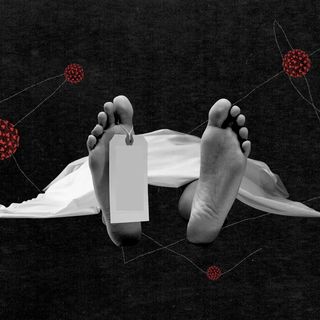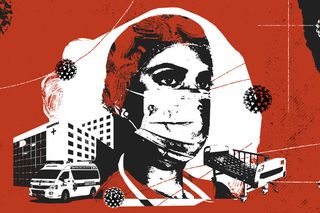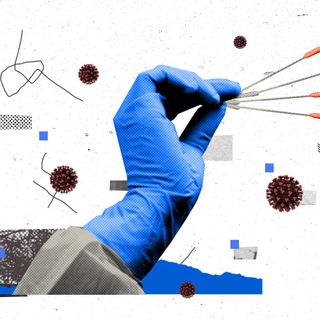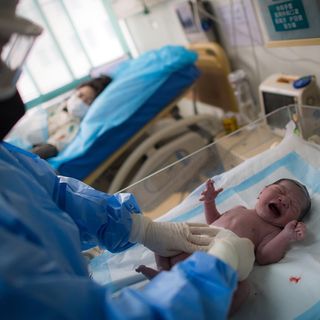
How Doctors Are the Unwitting, Frustrated Soldiers in the War Against Covid19
“We can appreciate doctors who work in these violent and inadequately protected conditions, but cannot blame those who choose not to.”

Frontline healthcare professionals have been applauded — with hands, with utensils, with candles — for their grit, determination, and steadfastness during the Covid19 pandemic. These heroes, as media headlines and government officials so often like to call them, are portrayed as unwavering in their duty to the nation. In reality, however, these heroes are disgruntled, frustrated, afraid, and most importantly, endangered. This heroship has been thrust upon them, with little to no supporting materials to help bear this burden. India’s doctors, to put it simply, are exhausted.
Doctors say they are exposed, unprotected and even antagonized for doing the job they’re outwardly exalted for. They say the coronavirus pandemic has laid bare the cognitive dissonance with which this country treats its medical professionals — professionally, they might be considered part of the noblest profession, respected and revered, but only in theory. The reality as so brutally revealed in these times is that this abstract sense of awe and respect never really translated to how they’re treated, even while they risk it all to fulfill their oath.
“[Treating coronavirus patients] is akin to defusing 1000 active bombs. You never know which might take you down,” says oncologist Viraj Nevrekar, M.D., former secretary of the Association of Resident Doctors (RDA) at the All India Institute of Medical Sciences (AIIMS), New Delhi. “There are two devils that need to be tackled. One is pure numbers — who are getting affected or who might potentially get affected. Second is the fact that the disease is transmissible and we could be in line to be affected by it.”
The first roadblock to doctors being able to do their jobs in fighting the pandemic is a lack of personal protective equipment (PPE), including N95 masks, gloves, goggles, face shields, and coveralls that protect them from getting infected by patients. “While we do understand that the nation cannot have lakhs of PPEs lying around on normal days, it must have a system to escalate its production in a short time especially in correlation with the rising stage of the pandemic,” Dr. Nevrekar says. As India scrambles to import PPE kits from other countries and attempts to begin large-scale manufacturing domestically — even as the entire world faces a PPE shortage — doctors say it is simply not fast enough. Meanwhile, they are dying, and hospitals are becoming hotbeds of the coronavirus.
In emergency situations, “we don’t have time — it’s split-second decision-making and life-saving intubation and CPR protocols [we’re doing]. And while intubating we are totally exposed to the patients’ oral airway, inches away,” critical care resident D. M. says. All the while, doctors are having to use raincoats and helmets instead of PPEs, while they’re encouraged to only use available gear when treating a Covid19-positive patient. That, unfortunately, is already too late — for themselves and for their patients.
“Our army men are ready to defend the nation even with sticks,” Dr. Nevrekar remembers Jawaharlal Nehru saying at the time of the Indo-China war. “Doctors too are ready to do that this time,” he says. “But what central and state governments need to think about is — can the nation be saved by fighting with sticks?”
Related on The Swaddle:
WHO: Abortion Is an Essential Healthcare Service During Covid19 Pandemic
Moreover, doctors’ calls for more PPEs have been met with threats and detentions from law enforcement. West Bengal police detained an oncologist for voicing his disappointment regarding the lack of safety equipment for doctors; all around the country, doctors are taking to the streets to protest, and are encountering resistance from law enforcement and the government. Condemning this backlash, AIIMS’ RDA urged Prime Minister Narendra Modi to “ensure these ‘soldiers’ are heard, their opinion respected, rather than humiliated,” in an open letter.
Even as their lives are endangered by the Covid19 pandemic, doctors say their dignity is being stolen, both by law enforcement attempting to suppress their demands and by patients who seem to always want more. Patients have insulted, verbally abused, and assaulted doctors, they say. Not only have doctors working in Covid19 wards been ostracized by their neighbors for being carriers of the virus, reports suggest they have also been spat at, chased away from their homes and verbally abused, BBC reports.
“Patients blame inadequate supplies given by the government on the doctors,” A.B.*, a government doctor who spoke to The Swaddle on the condition of anonymity, says, describing an incident when a patient started “howling” at him because the electricity in their room had switched off for a moment. “They abuse us for not getting [new] daily towels or if they are getting the same food,” he says, adding “[patients] need to understand that they are in the middle of a crisis and they can’t expect all the budget to be spent on towels or soaps … they need to understand it’s a national emergency. You have not come to stay in a 5-star hotel for a vacation.”
And a vacation it is not. India only has one doctor for every 1,457 citizens, according to government data. “On average, a resident doctor attends to 20-30 emergencies per day,” Dr. Nevrekar says, which is draining, both physically and mentally. Intensive care unit (I.C.U.) shifts themselves can last up to 12 hours, according to D.M. “Most doctors [are] being overworked beyond their duty hours or [are being] sent to specifically set up Covid19 units on a rotation basis as volunteers to work in these trying circumstances,” he adds. These volunteers — which the government has said in the past could include medical and nursing students, and even dentists — are being brought on to alleviate the burden on older doctors who are at greater risk of contracting the coronavirus. Many doctors worry, however, that without proper emergency training and experience, these volunteers could compromise outbreak response. But with a shortage of trained Covid19 responders, there doesn’t seem to be much choice in the matter.
Now, with community transmission at play, all doctors — not just Covid19 responders — are dealing with this reality, Dr. Nevrekar says. Now it’s not just the quarantined suspects brought from airports or those coming into hospitals with symptoms that can expose doctors to Covid19. With the possibility that any and every person in India could have been infected by someone from their surroundings, all doctors, regardless of if they’re exclusively handling coronavirus cases, are at risk.
Lack of PPEs, overwork, threats by patients have all become “the last straw that broke the camel’s back,” Pune-based psychiatrist Dr. Dayal Mirchandani says. As a result, many doctors around the country have submitted their resignations, even as hospitals refuse to accept them and consider taking strict action and file FIRs against those who want out. In defense of doctors resigning, Dr. Nevrekar says, “This time our life is on the line. We are afraid and honestly not prepared for losing life to infection or violence. We have reached a point where the choice of working in these conditions is individual. Society or oath cannot force someone to risk their lives.” He adds, “We can appreciate doctors who work in these violent and inadequately protected conditions, but cannot blame those who choose not to.”
Related on The Swaddle:
Centre’s Insurance Scheme For Healthcare Workers Covers Death, Not Treatment Costs
On top of it all, Dr. Mirchandani says “there is a huge possibility of depression, anxiety among junior doctors. The number of doctors who will suffer PTSD after this will be staggering. What will end up happening is people might not be able to do their best for their patients.”
Frontline doctors around the world are reporting heightened levels of distress, insomnia and other severe mental health issues as they soldier on amidst the coronavirus pandemic. This is exacerbated by them having to isolate themselves from their families, so they can protect both their loved ones and their patients, often from their own selves. “Personally, it’s highly draining because you are always skeptical and not sure what to expect. The mental trauma stays the whole time till the patients’ test reports come,” D. M. says. “The amount of hours of work, mental exhaustion, the tremendous patient load we have to cater to is beyond what most people can comprehend.”
And still, they trudge on, as heroes, and as people who have not been left with many choices. “When I took the oath, I was aware of the sacrifices that this profession demands. What I and many others weren’t aware of was that apart from the patient-doctor [relationship], there is a third wheel called administration, and unfortunately and unwillingly, we have to be its face,” Dr. Nevrekar says. “What we realized was that patients are in deep trouble when they come to us. We are their only hope and solution. Over a period of time, we become accustomed to this responsibility entrusted by patients.”
But with responsibility comes “hero fatigue,” he says. “We were always prepared to dedicate our lives to healthcare, not lose it literally. This isn’t part of our hero contract.”
Rajvi Desai is The Swaddle's Culture Editor. After graduating from NYU as a Journalism and Politics major, she covered breaking news and politics in New York City, and dabbled in design and entertainment journalism. Back in the homeland, she's interested in tackling beauty, sports, politics and human rights in her gender-focused writing, while also co-managing The Swaddle Team's podcast, Respectfully Disagree.
Related


ICMR Recommends Pooling Test Samples for Covid19 in Low‑Infection Areas
